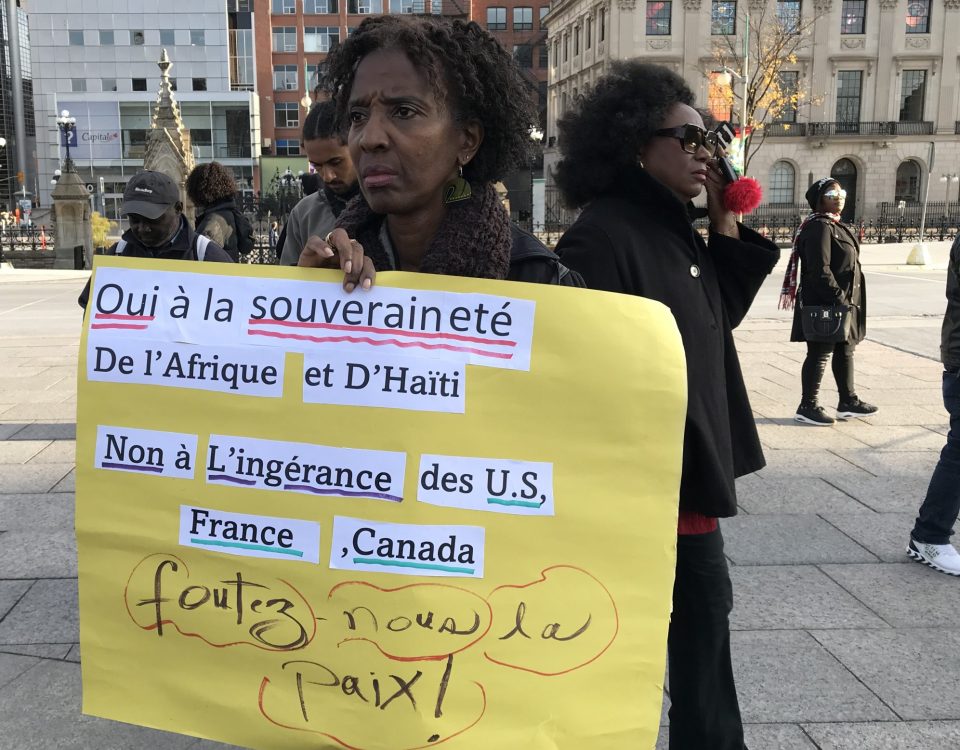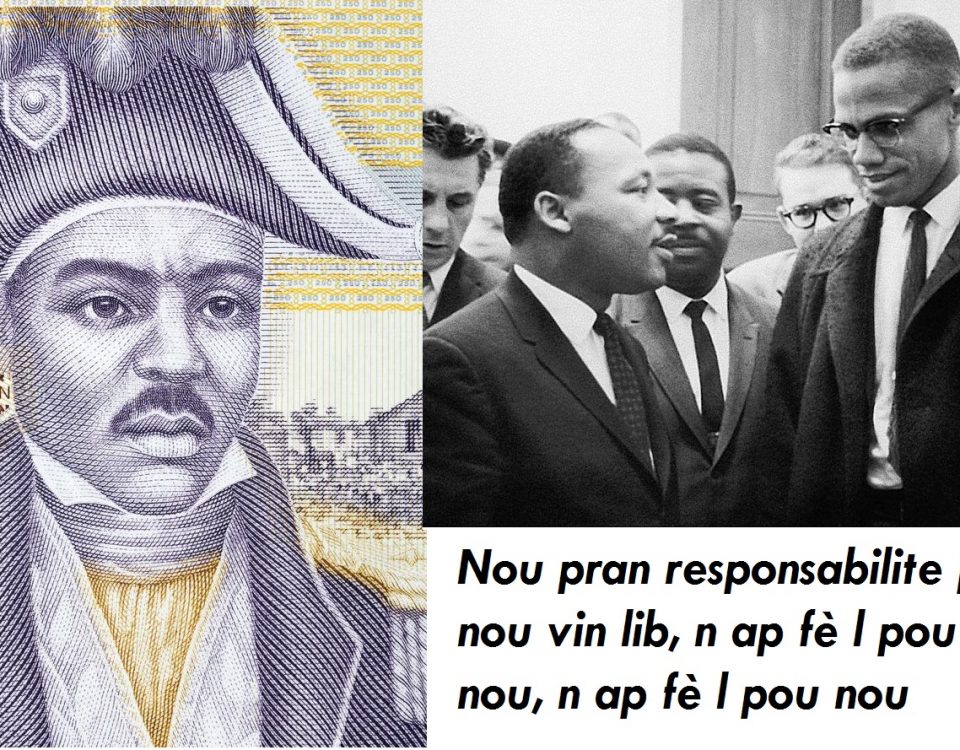- Depi nan Ginen bon Nèg ap ede Nèg!
- jafrikayiti@gmail.com
Five truths about Haiti

Konbit wete pay, geri trip
January 6, 2020
Ayisyen nan Kanada: Atansyon!
February 17, 2020Five truths about Haiti
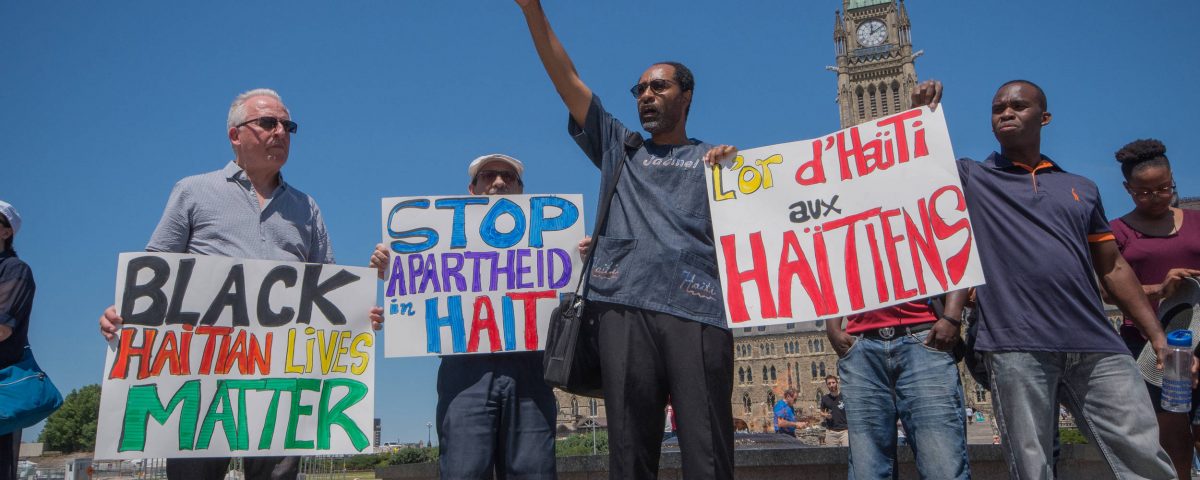
As we approach the 10th anniversary of Goudougoudou, the 7.0 earthquake that caused over 300,000 deaths in Haiti on January 12, 2010, I invite you to ponder 5 key facts I consider to be essential knowledge for anyone who truly wants to understand why, though tens of billions of dollars were collected worldwide for their wellbeing, the Haitian population continues to endure the most dire situations in 2020.
1. Haiti is currently under a fifteen year long foreign occupation that predates the 2010 earthquake.
Some people assume or have read that “UN Troops were deployed to Haiti, after the 2010 earthquake, to deliver humanitarian aid and help rebuild the country” ? – FALSE!
UN Troops (MINUSTAH) have been in Haiti since June 2004 to consolidate the U.S-France-Canada orchestrated Coup d’Etat against Haiti and its leftist, progressive president, Jean-Bertrand Aristide.
Chapter 7 of the UN Charter was evoked then to justify troops deployment in violation of both, the UN Charter itself, and the Haitian People’s right to self-governance.
Ezili Dantò of the Haitian Lawyers Leadership Network observes that: “The same UN Resolution 1542 also unilaterally declared, not only a Chapter 7, shoot-to-kill peacekeeping mission on a country not at war, with no peace agreement of opposing parties to mediate, but established the formation of an international team of foreigners, called the Core Group, to run Haiti through fake elections that, in its application these last 15-years, essentially excludes the voices of the masses and prevents popularly elected presidents to be seated in Haiti, ever again”.
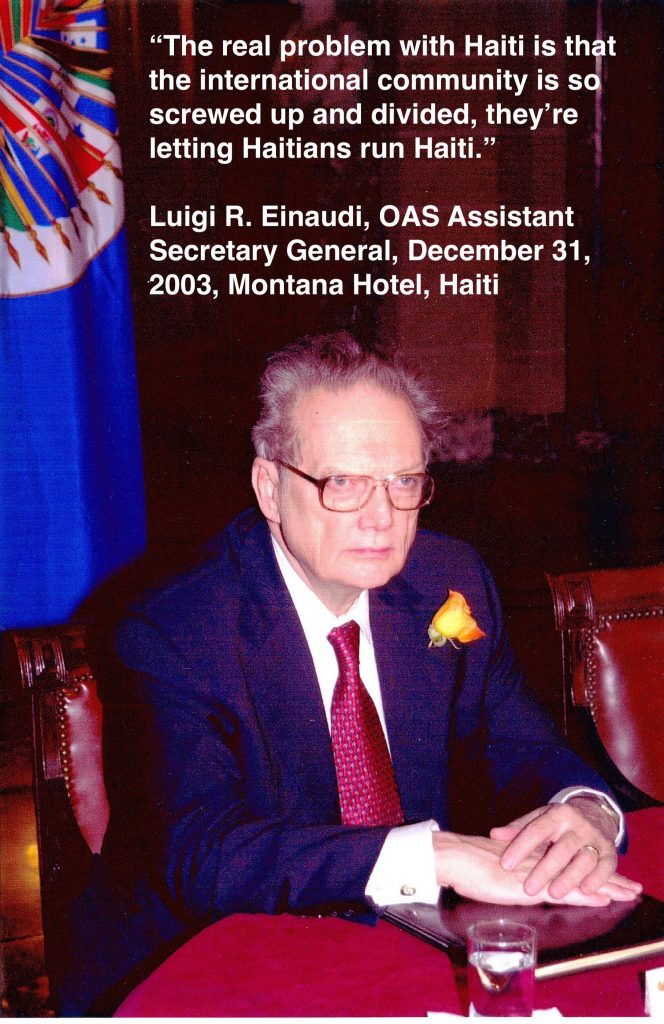
Essentially, the bicentennial coup against Haiti is an imperialist, racist invasion masquerading as “humanitarianism”.
2. Foreign tutelage, sporadically proposed as a potential means to “fix” Haiti, has in fact proven the primary ill that plagues Haiti, over the past 15 years.
Some people assume or have read that “the ongoing cholera epidemic which caused tens of thousands of deaths in Haiti was a natural aftermath of the 2010 earthquake” – FALSE!
From 2004 onward numerous crimes, massacres, contagions and sexual exploitation (including pedophile rapes) against the people of Haiti have been attributed to the illegally-deployed UN troops. Their egregious violations of human rights are well-documented, with some studies published, as early as 2005, in the British Medical Journal, The Lancet.
Ever since the invasion planning meeting held in Gatineau, Québec (Canada), on January 31 and February 1, 2003, it was evident that Haiti’s very population is seen as a «threat». The foreign troops are effectively deployed to contain that «threat».
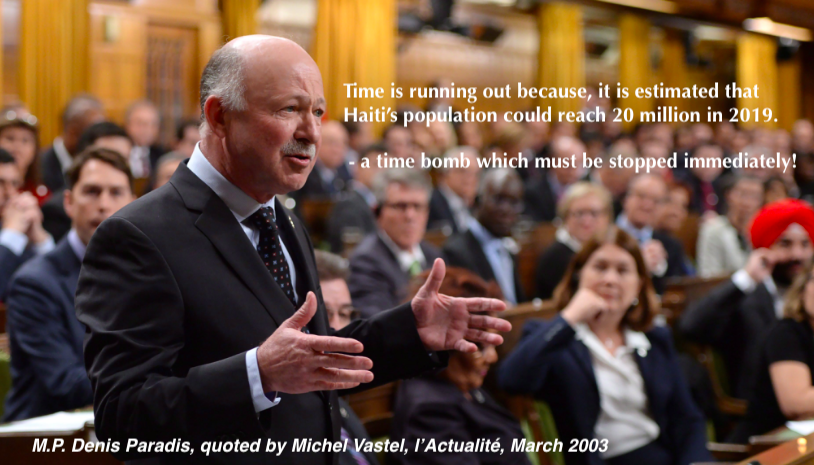
One of the most disastrous consequences of the Coup and subsequent U.N. tutelage is that Haiti, a country with no known cases of cholera for the past 100 years, now has one of the worst cholera epidemics in the world. Over 50,000 Haitians have been killed and nearly a million sickened by cholera since October 2010, when U.N. troops contaminated a major source of drinking water in the country with the deadly bacterium.
Although it is a recurring myth that appears in media publications, there is no link whatsoever between the 2010 earthquake and the cholera outbreak, except for the coincidental fact that they occurred during the same year.
Several conclusive scientific studies have demonstrated that this deadly contagion was caused by UN troops (MINUSTAH) who dumped their fecal waste in the Meile, a tributary to the Artibonite River, major source of water for every day use, in the Central Plateau region.
Making the case for foreign take over of Haiti, Canadian politician Denis Paradis, apparently lamented that, in 2003, Haiti’s unemployment rate was as high as 60%, it’s GDP $469 per inhabitant, life expectancy as low as 50 for men and 54 for women, and in Human Development Index (HDI) Haiti ranked 150th, among 173 countries. What are the 2020 numbers, after 15 years of foreign tutelage?
In 2020, Haiti ranks 169th in terms of HDI.
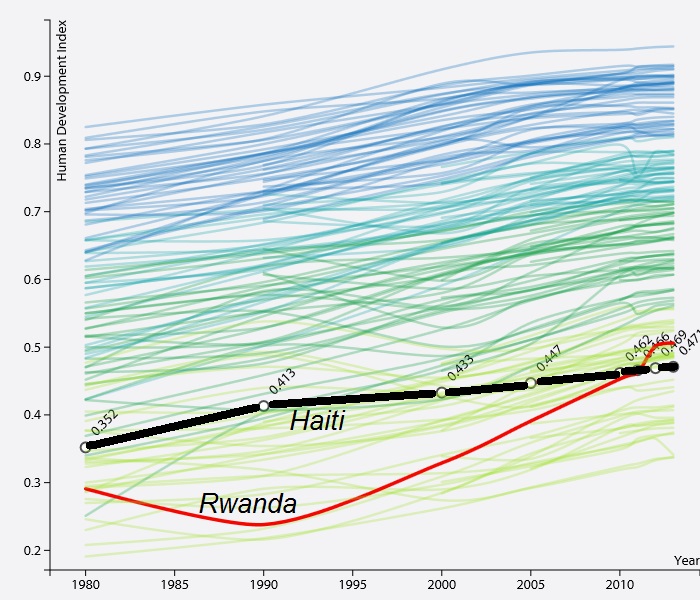
During the period of foreign occupation (2004 to present), the socio-economic situation of Haitian families has deteriorated drastically. Over the same period, Rwanda, a country recovering from horrendous socio-political trauma, significantly improved its human development performance, moving its HDI from several points below that of Haiti in 2004 and surpassing it since 2011.
It is obvious that the devastation wrought to Haiti by the 7.0 magnitude earthquake on January 12, 2010 is completely out of proportion with what would be expected in a better-equipped country. Much have been said and written about the utter state of vulnerability in which the earthquake found Haitians.
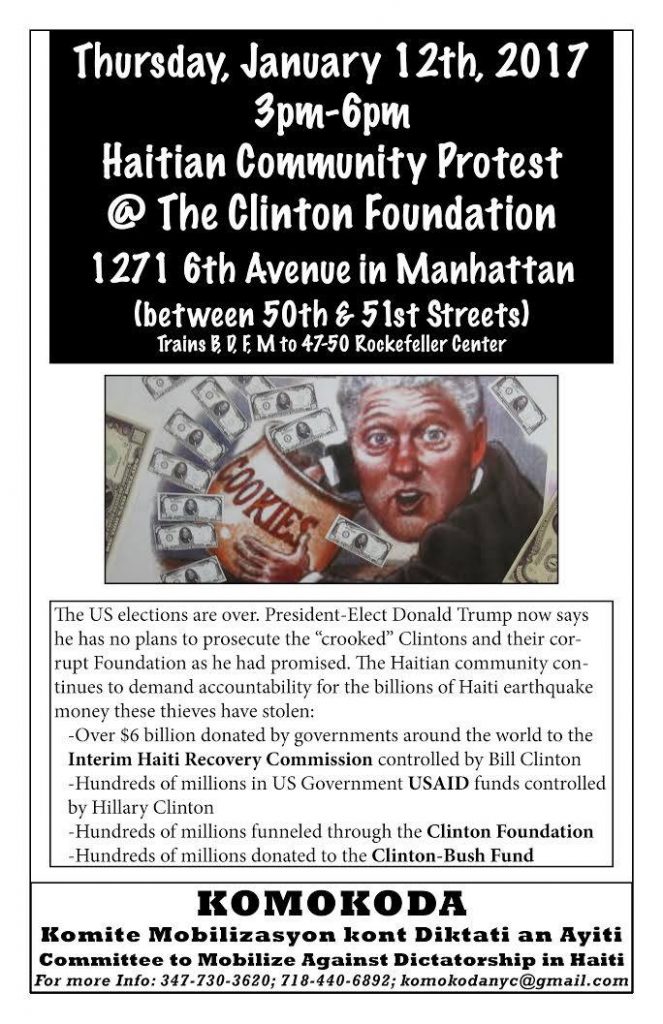
What is less often discussed is why, 10 years after the quake, despite billions of dollars collected in their name, Haitians are more vulnerable than ever.
The objective facts point to foreign intervention being a main culprit, in the embezzlement of Haitian Relief Funds as well as in the destruction of what little infrastructure Haiti had prior to the 2004 coup d’état.
An article titled “Victims of the Storms: A Political Hurricane Hits Haiti” by journalist Kevin Pina was published by The Indypendent, on October 6, 2005. It provides these shocking details:
“The political storm took many victims as well, leaving Haiti ill-prepared for the devastation brought by (Tropical Storm) Jeanne. One of its first victims was the Civil Protection Office, following a rampage led by the “freedom fighters” against suspected Aristide supporters“.
Pina continues… “Tropical Storm Jeanne was exactly the type of disaster USAID and PADF’s programs were set up to manage. Components of the Civil Protection Office monitored incoming tropical storms and provided an advanced warning and preparedness network designed to plan a response before disaster struck. Plans included advising communities of approaching storms and preparing for them by storing large supplies of drinking water, food, medical supplies and portable tents for those displaced from their homes.
When Jeanne hit Haiti, these structures no longer existed. All of the trained and competent participants in the program had long been driven out of the area, their offices pillaged and burned. Nowhere was this more evident than in Gonaïves”.
Note: It is now an established fact that said “freedom fighters” referenced in Pina’s report, attacked and murdered many of Haiti’s few trained Emergency Responders with weapons, munitions, political and U.N. military support and protection provided to them curtesy of U.S. and French Government sponsors.
3. The People of Haiti have solid, credible and well-documented cases for Restitution and Reparations from France, the United States and the United Nations.
Haiti is an international crime scene – TRUE !
This is why, 10 years ago, when the earthquake hit, I insisted that what is now required is not more foreign intervention under the guise of « aid », but long overdue, significant REPARATIONS!
Haiti’s restitution demand is related to but quite different from its equally legitimate arguments for reparations. Here is how, Haiti’s case for Restitution was presented in a 2017 opinion piece published in Forbes:
“In 1825, barely two decades after winning its independence against all odds, Haiti was forced to begin paying enormous “reparations” to the French slaveholders it had overthrown. Those payments would have been a staggering burden for any fledgling nation, but Haiti wasn’t just any fledgling nation; it was a republic formed and led by blacks who’d risen up against the institution of slavery. As such, Haiti’s independence was viewed as a threat by all slave-owning countries – the United States included – and its very existence rankled racist sensibilities globally. Thus Haiti – tiny, impoverished and all alone in a hostile world – had little choice but to accede to France’s reparation demands, which were delivered to Port-au-Prince by a fleet of heavily armed warships in 1825“.
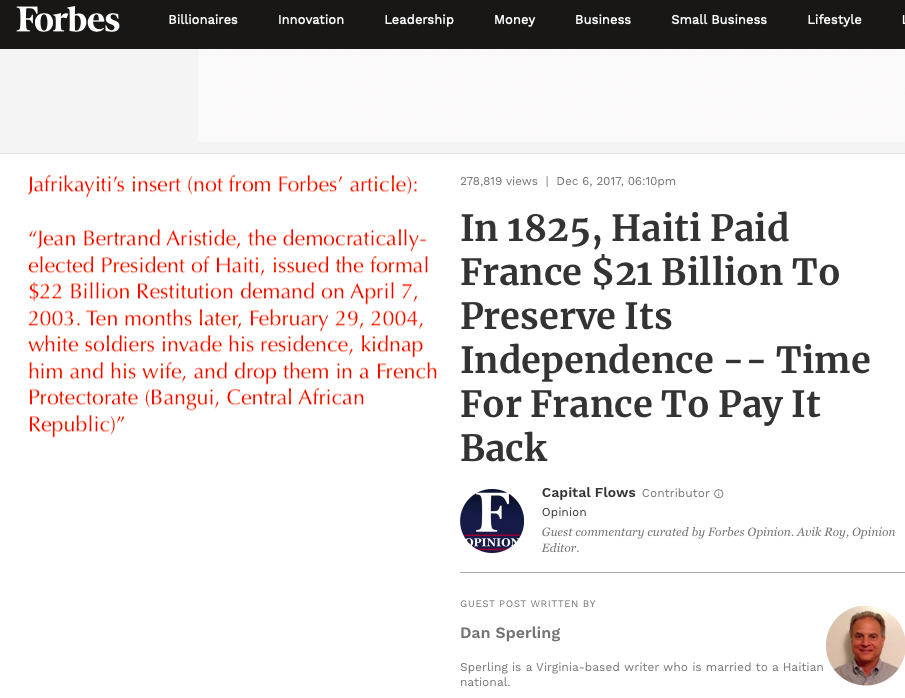
Given the period in which France, with support from its U.S. cousins, collected that outrageous ransom from Haiti (1825-1947), this violent act can effectively be considered a theft of Haiti’s breast milk. While other countries were building their physical infrastructure, throughout the industrial revolution, the Africans of Haiti were denied their primary resources which were diverted to feed an insatiable French population.
President Aristide’s fate in 2004 was not an isolated incident. For instance, Haitian Emperor Faustin Soulouque who refused to make the ransom payments in 1852, was attacked by gun boats, and also eventually deposed and sent to exile. In fact, throughout the 20th century, Haiti was incessantly under attack by white powers.
Its restitution claim, albeit solid and well-documented, Haiti shall continue to meet fierce resistance from French governments as well as those of their European and Euro-American cousins.
Indeed, black Haitian bodies appear to represent an ever present “threat” in the psyche of many inheritors of wealth accumulated through European-led racial enslavement and colonization of the native peoples of Africa and of the Americas.
In addition to its straightforward case for Restitution of the Charles X Ransom, collected by the French State (an identifiable legal entity), Haiti is no doubt part of the Global Reparations Movement. Whenever, a genuine Haitian Government is in place, its representatives take part in reparations-related initiative like the memorable Durban Conference of September 2001.
The Government of the United States of North America as well as the United Nations have, thus far, refused to address the legitimate reparations claims of the Haitian people. However, the archives are being compiled to be used when, eventually, Haitians will regain control of their territory.
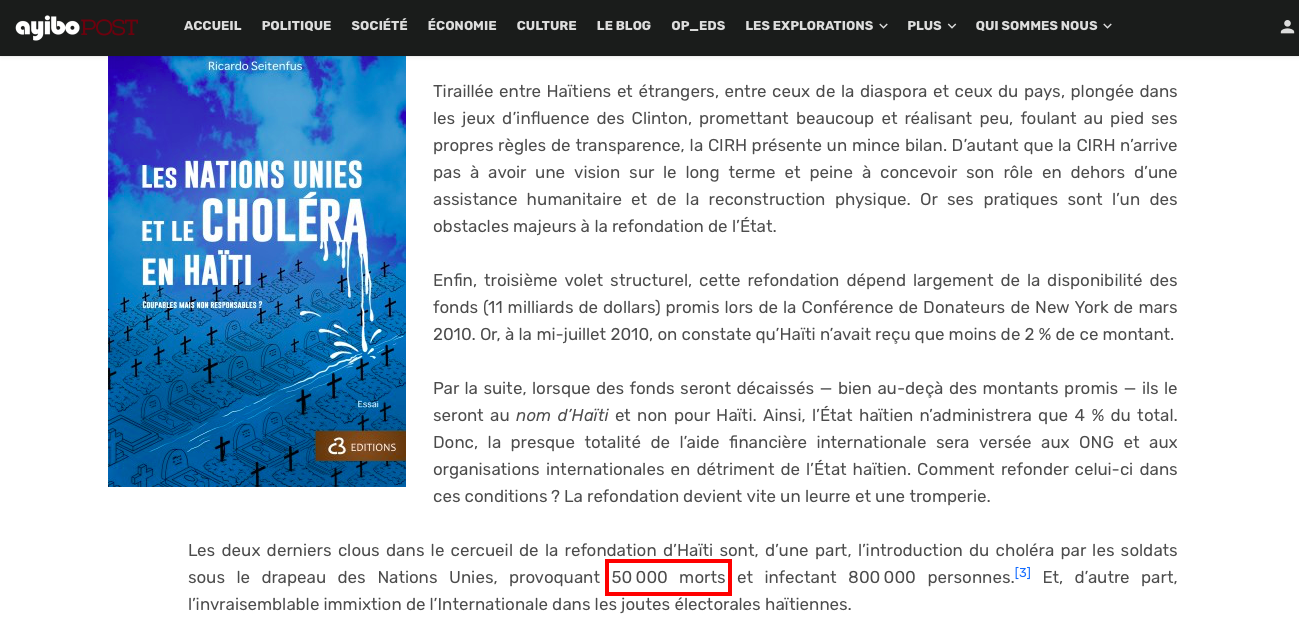
4. The foreign-installed “Government of Haiti”, presided by Jovenel Moise, is a fraudulent entity that was rejected by the Haitian population from inception.
Jovenel Moise is the legitimate, democratically-elected President of Haiti – FALSE!
On January 9, 2020, Radio-Canada broadcasted a documentary titled “Peyi Lòk, Haiti sous influence“. The closing scene features so-called Haitian President Jovenel Moise. The latter who, in addition to being dubbed an indicted thief by the Haitian justice system for alleged embezzlement of millions of Petro Caribe Funds, has now attracted the anger of the Haitian People because he repeatedly betrays Venezuela’s legitimate government of Nicolas Maduro at the Organization of American States (OAS), presumably, under pressure from masters in Washington D.C.
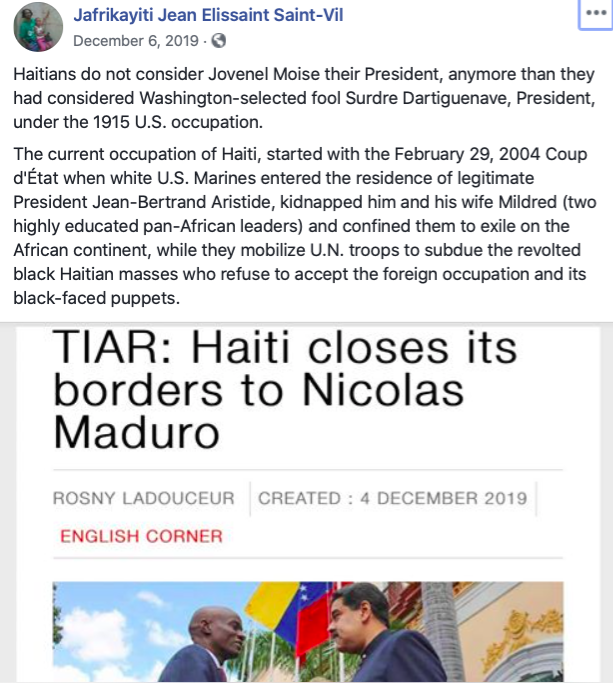
It is important to note such situations, shocking as they may be, do follow the logic of a foreign occupation whereby the local corrupt regime plays the role of buffer and “errand boy” for its foreign sponsor and master. Be not surprised to learn that “Haiti”- once upon a time – “declared war to Japan, Italy and Germany, simultaneously”. Of course, this was during the overt U.S. Occupation of 1915-1934 when, although white men in Washington were calling all the shots about what Haiti does or doesn’t do, the Yankees opted to impose a set of mulatto dictators (Dartiguenave, Lescot, Borno, Roy, Vincent) to serve as pretend “president” who help them rule over the “unruly natives”.
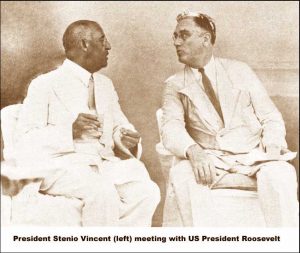
Sténio Vincent, “President of Haiti”, seen in the picture with U. S. President Roosevelt (right) accepted orders from the latter to bow to his friend Raphael Trujillo who was put in charge of the Eastern 2/3 of the island. Having massacred 30000 Blacks (Dominicans and Haitians), Trujillo was advised by his friend Roosevelt to offer the price of a pig for each «Haitian», he admits to have killed during the «Perejil massacre». Vincent not only accepted the payment, he went to the border to celebrate his fellow mulatto criminal Trujillo while Roosevelt applauds.
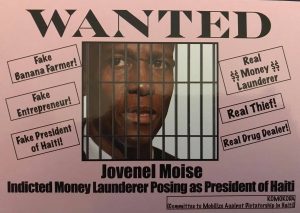
As multiple demonstrations conducted in Haiti, New-York, California, Ottawa, Montreal, Caracas etc… have shown, corrupt post-coup puppet regimes installed and maintained by the Core Group are highly unpopular.
5. There exists many solutions-oriented Haitians on the island and abroad who are truly engaged in and committed to progressive systemic reform.
It is hopeless for Haiti – FALSE!
Another important observation to make about 2020 Haiti is that, like in most other countries, politics in Haiti is not a made-for-tv cartoon where all the “good guys” and “good gals’ play for the same team, wearing the same uniform. Despite years of repression under hostile foreign powers, Haitians strive to build and nurture a vibrant nation. Divergeant views and opinions co-exist on every topic of societal importance one can imagine. The search for remedies to help address the current political quagmire is no exception.
The much decried political and economic elites of Haiti, for all their ills, also include positive forces who shall help bring about the radical changes a new generation demands for Haiti. The island-based upper, middle and popular class Petro Challengers featured in Radio-Canada’s recently-aired documentary are precious comrades in arms for us, “dyaspora”, who now reside in Canada, the U.S. or other parts of the world.
To this point, allow me to close with a statement from our Solidarité Québec-Haiti comrades.
Press Release from Solidarité Québec-Haiti
We are commemorating the earthquake that devastated Port-au-Prince and its surroundings 10 years ago. On January 12, 2010, in a few minutes, hundreds of thousands of people died, and more were injured and marked forever.
“The earthquake was a most horrible natural disaster, because it caused incredible suffering, especially because of decisions taken in Washington, Paris and Ottawa,” explains Turenne Joseph of Solidarité Québec-Haiti.
According to an assessment of American financial aid carried out two months after the earthquake by the Associated Press, only one cent per dollar was reaching the Haitian government (U.S.$0.33 went to the United States army). Other investigations came to the same staggering conclusion. The United States Red Cross, after raising U.S.$500 million for Ayiti and publicly boasting about its housing efforts, only built six permanent homes.
“Instead of supporting the reconstruction efforts of Haitians to ‘rebuild better,’ the reconstruction process has undermined Haitian sovereignty even more,” said Jennie-Laure Sully of Solidarité Québec-Haiti.
A year after the earthquake, the Canadian Press revealed internal government documents showing that Canada had deployed 2,000 troops (alongside 12,000 American troops) to prevent any possibility of a “popular uprising” and to prevent Jean-Bertrand Aristide, the president that foreign forces had expelled from the country, to return to Ayiti.
“It is a damning observation of Canadian policy in Ayiti to see that in the aftermath of the terrible tragedy, decision makers in Ottawa were more concerned with keeping the Ayitiens under control than helping the victims of the earthquake,” said Ms. Joseph.
“If Justin Trudeau’s government really wants to commemorate the 10 years of the earthquake, it should announce that Canada is withdrawing from the Core Group, a group of representatives of foreign countries that supports the repressive, corrupt and illegitimate president Jovenel Moïse in Ayiti” says Ms. Sully.
****

